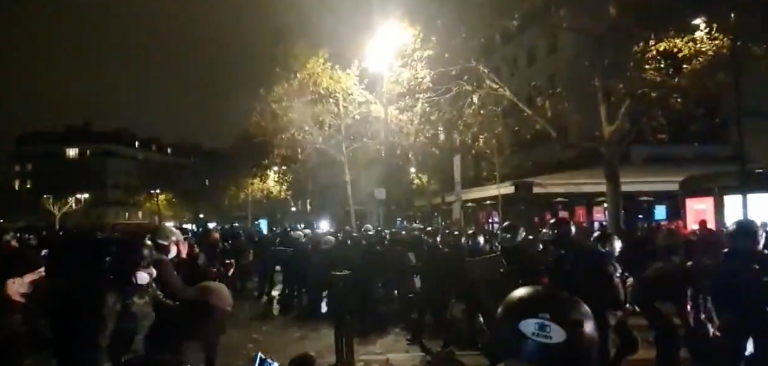The French government is being criticized for attempting to limit press freedoms and free speech. The issue is rather weird from a country that has recently been championing itself as supporting freedom of speech – but not so weird considering the various online censorship laws that lawmakers keep trying to pass in the country.
The French government recently passed a new security law containing a clause that banned the filming of law enforcement officers. The provision makes it a crime to “disseminate by any means or medium whatsoever, the image of the face or any other identifying element of an officer when engaged in a police operation.”
Even journalists reporting on police issues would not be allowed to film officers on duty. Breaking the law could result in a one-year prison sentence and fines of up to €45,000 ($53,000).
Authorities have already arrested someone for breaking the new law. On Tuesday, during a protest of the new law, a France 3 journalist was arrested outside the National Assembly. The officers did not care that he was a journalist with the required press credentials.
https://twitter.com/AnonymeCitoyen/status/1330198450248552454
Protests have broken out in the country over the new law.
According to Minister for Interior Gérald Darmanin, the journalist was arrested because he had not told law enforcement that he intended to cover the demonstration.
“I would therefore remind you that if journalists cover demonstrations, in accordance with the law enforcement plan, they must approach the authorities,” Darmanin said during a press conference on Wednesday.
Journalists and free speech advocates have criticized the law, which, according to the government, is intended to protect law enforcement officers on duty.
“The powers that be are trying to stop the press from doing its job reporting on state violence — it’s not just the police, it’s the state behind them,” said Edwy Plenel, an editor at the investigative outlet Mediapart.
In a news piece, Le Monde, a French newspaper, claimed that the law “grossly violates a democratic right.”
Legal scholars say the law is an attempt by the government to escape accountability. Constitutional expert Patrick Weil noted that the law would make it impossible to make a video showing the death of George Floyd in France.
Others argued that the law sabotaged President Macron’s efforts to present the country as a global leader in free speech and press freedom.
After the beheading of a teacher in Southern France by an Islam extremist for showing prophet Muhammad’s caricatures in class, the president said, “I will always defend in my country the freedom to speak, to write, to think, to draw.”
“The president of the republic presents himself as the champion of press freedom in the Muslim world,” said Dov Alfon, an editor at French newspaper Libération, who previously worked at Israel’s Ha’aretz newspaper. “He explains abroad that France is superior, or at least has culturally superior ideas, because here there are laws that guarantee the freedom to caricature, to express an opinion, to analyze and to inform.
“But returning to France, he allows his ministers to propose laws that resemble those of the countries he’s just criticized.”
The backlash forced the Ministry of Interior to exempt journalists from the new law. However, the office has not formalized the exemption.
Yet, in recent times, it’s often citizens that have been able to film any abuse of power from French police, including during protests – not journalists. This new law threatens that.










